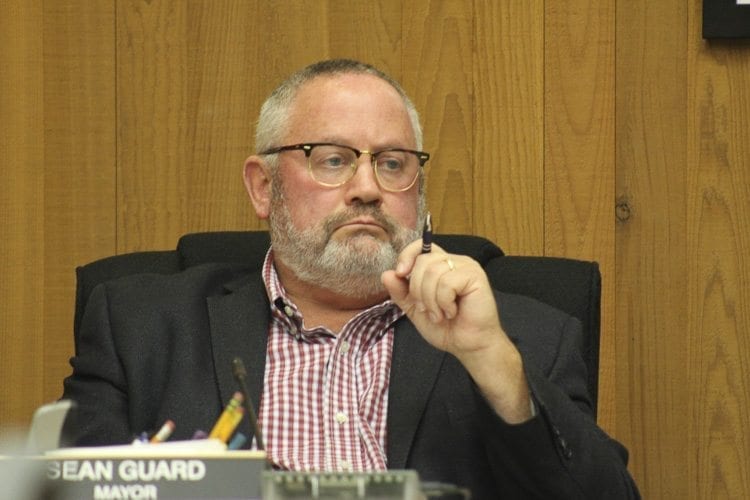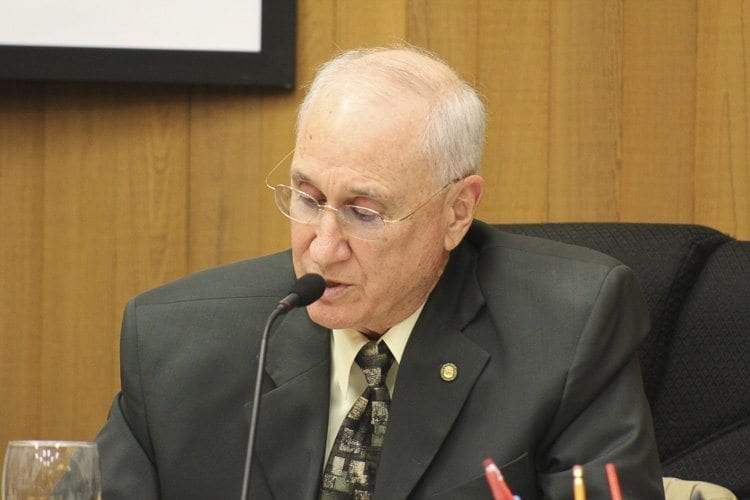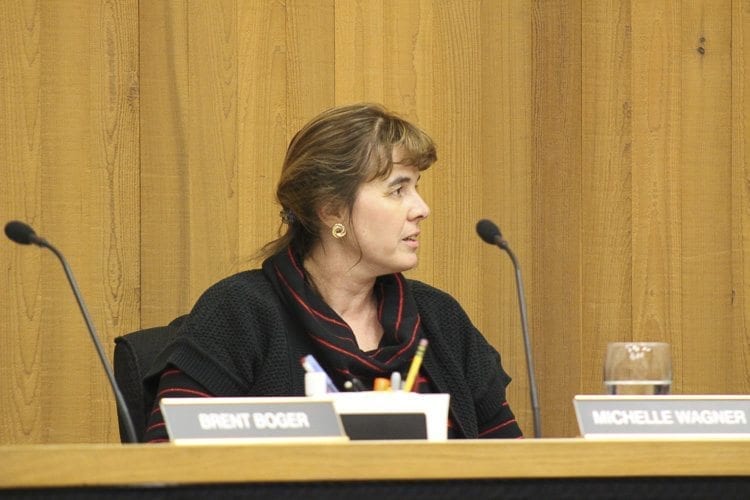Mayor Sean Guard’s veto on fireworks ban stands, new fireworks ordinance enacted
WASHOUGAL — Members of the Washougal City Council voted Monday night to enact a “safe and sane” fireworks ordinance restricting certain types of fireworks in the city limits, after Mayor Sean Guard vetoed an ordinance last week that would have banned all personal fireworks in Washougal.

At last week’s meeting, the council members were presented with two options to address the issue of excessive fireworks use in Washougal. Ordinance Option A constituted a complete ban on all personal fireworks in Washougal. Ordinance Option B consisted of “safe and sane” guidelines that would limit personal fireworks to those that rose no more than one foot in the air or traveled less than six feet along the ground.
In a 4 to 3 vote, the council members approved the ban option, but after the meeting had adjourned, Guard vetoed the ban.
During Monday night’s meeting, the council members discussed the options for proceeding. To override the veto, a majority plus one in favor of overriding it was needed, necessitating five votes, according to David Scott, city administrator for Washougal.
Instead of moving to override the veto, the council first voted on enacting Option B to restrict personal fireworks but not ban them completely.
Council Member Brent Boger said that he initially voted in favor of the fireworks ban, but was willing to enact the “safe and sane” restrictions instead with the intent that the success of Option B could be examined in the coming years to see if it was effective.
At last week’s meeting, Council Member Dave Shoemaker was in favor of banning personal fireworks.
“I was shocked to get a message at 10 o’clock at night that you had vetoed something that you hadn’t even discussed in public session,” Shoemaker told Guard, and asked the mayor why he did not indicate during the meeting that he intended to veto the ordinance.
Guard said that he had made it known on many occasions prior to the vote that he would not support a complete fireworks ban, and said that statute gave him up to 10 days to veto the ordinance.
Another reason he waited until after the meeting, Guard explained, was that there had been questions regarding the timeline of when the public could bring a referendum on the council’s decision up for consideration. Guard said he wanted to confer with the city administrator and city attorney that a veto would not interfere with the referendum process before he issued the veto.

Guard said that he would be in favor of adopting Option B, and even would have supported the ban if there had been a “clear consensus of the council to go that direction.”
According to Guard, the survey efforts of the city had received mixed results in citizen feedback, with a majority of Washougal residents wanting to retain personal fireworks in some capacity.
“To me a 4 to 3 [vote] is certainly not an overwhelming majority,” Guard said.
Shoemaker explained that he was dissatisfied with the abruptness of the veto.
“My upset was being blindsided,” Shoemaker said. He also said that since overturning the veto required 5 votes, and only 3 council members had voted against the ban, the “minority council position is going to be enacted as law in this city.”
Council Member Paul Greenlee, on the other hand, felt that the veto was “appropriately respectful, and I didn’t feel in any way slighted.” Greenlee had voted in favor of the ban at last week’s meeting.
At the previous meeting, Council Member Michelle Wagner voted against the ban, and said that she believed the mayor made the right decision to veto based on feedback from Washougal residents.
Wagner said that she would not support Option B, as it would be difficult to enforce. Further, Wagner wanted to have better citizen feedback before proceeding with any action regarding fireworks.
“I still want to get a good gauge from the public,” Wagner said.
Ron Schumaker, fire marshal of the Camas-Washougal Fire Mashal’s Office, stated during the meeting that he believed a ban is easier to enforce, but that the “safe and sane” option is “workable.”
Council Member Joyce Lindsay, who was not present for the meeting but participated via telephone, said that she would be in favor of passing Option B, evaluating its effectiveness and addressing the issue again at a later date. She also noted that residents in favor of a complete fireworks ban could start a ballot initiative, and “a vote would give us a real indication of where people stand on this.”
The council voted on enacting Ordinance Option B, and the motion failed 4-3 with council members Michelle Wagner, Ray Kutch, Dave Shoemaker and Dan Coursey voting against it.
Shoemaker then moved to override the veto. The veto was not overturned, as 5 votes in favor of doing so could not be gained. Council members Boger, Shoemaker and Lindsay all voted to override the veto.
After the veto override failed, Shoemaker moved to reconsider Option B, and Boger seconded the motion. Option B thus went before the council a second time for a vote.

“This is bordering on absurd,” Wagner said when Option B was reconsidered.
At the second vote, Option B, the “safe and sane” option, passed 4 to 3. Boger, Greenlee, Shoemaker and Lindsay voted in favor of the option.
In public comments after the vote, Washougal resident Bill Durgan, who at last week’s meeting said he did not support any restrictions on personal fireworks, said “I’m surprised you guys passed that.”
“I thought you’d maybe put it out to the people for a vote,” Durgan said.
The ordinance restricting fireworks in Washougal will be enacted 30 days from the vote. Within that time, citizens can gather signatures on a petition for a referendum that could bring the issue back before the city council and make the council members carry out the action dictated by the referendum.
If a referendum is not received, the restrictions will take effect a year after the vote. Thus, the restrictions will only start to have an effect during the 2018-2019 New Years celebration and the 2019 Fourth of July celebration.




